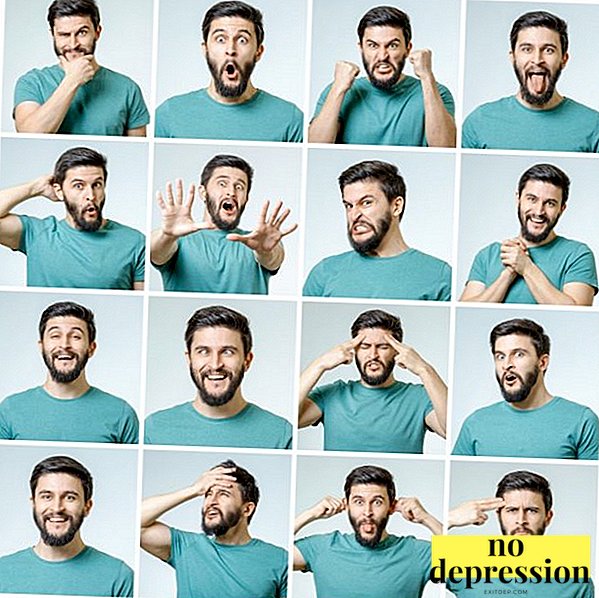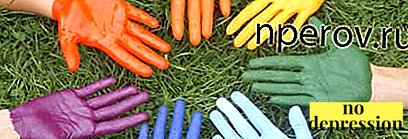Antidepressants - a kind of "pills for depression." They remove the feeling of depression, depression, and improve well-being in the depressed state.
Since this disease most often depends on the amount and work of certain hormones, their work is stabilized by these medicines, thus returning a person to a normal life.
What symptoms are discharged?

Antidepressants prescribed by psychiatrists, neurologists and psychotherapists.
Medicines are prescribed based on the situation: not only in the presence of depressive disorders, but also in panic attacks, neurological diseases, migraines and other diseases.
But in this article we will consider exactly the first option.
Drugs prescribed by the attending physician, focusing on the type of depression and its manifestations. Usually, diagnosis is based on common depressive symptoms:
- chronic fatigue, high fatigue;
- low performance;
- mood swings, irritability;
- anxiety, feeling insecure;
- drowsiness, fatigue, and general weakness;
- physical ailments - shortness of breath, pain in various parts of the body, nausea and vomiting;
- increased or low appetite;
- weight change;
- decrease in sexual function;
- sleep disorders.
The diagnosis can only be made by the attending physician who performs the clinical diagnosis.
Symptoms may vary. depending on the specific type of disorder. For example, in classical depression, patients lack sleep, in the case of atypical - hypersomnia, etc.

According to ICD-10, a diagnosis of depression is made with most of the following symptoms:
- depressed, low mood for a long period of time;
- loss of will to life, interests, motivation, feelings of joy;
- it is difficult for the patient to concentrate;
- self-doubt, complexes;
- guilt and inferiority complex;
- fatigue, problems with sleep and appetite;
- suicidal mood.
However, these symptoms stable and present for more than two weeks. Do not confuse depression with stress or bad mood, which periodically occurs in all people.
It is distinguished by chronic symptoms and can last for years without the intervention of doctors.
How often are prescribed medications for depression? Find out from the video:
General treatment rules
In treating depression, doctors rely on biochemical theory. The main causes of depressive disorder are two: biological (disturbances in the work of hormones responsible for emotional states) and psychological (psychological trauma and patient problems).
With this in mind, the treatment is divided into two components: the administration of medicines (antidepressants) and psychotherapy.

Soothing remedies, vitamins and homeopathy preparations for men and women individually matched depending on the clinical picture.
The length of the course also depends on the patient and what antidepressants he takes.
Success in drug treatment can only be achieved with strict adherence to medical recommendations.
What is the purpose of antidepressants, how do they improve a person’s well-being with depression?
The main drugs for the treatment of depression, chronic fatigue or dependence:
How do drugs work?
What pills to drink for depression? It is worth knowing that there are basic medications that relieve a depressive and similar condition to calm the nerves. They are divided into the following groups:
- Antidecision;
- Trankvilizatopy;
- Heyroleptics.
These drugs differ in the type of exposure, but they have one common thrust - the struggle with a feeling of oppression, fear and anxiety.
How does this happen? In humans, there is chemicals called neurotransmitters. They transmit nerve impulses to the brain, due to which the nervous system of a person works stably.
It is neurotransmitters that affect mood and behavior. Emotions and reactions depend on the type of nerve impulse, its size and strength. And among these substances there is a group of those that are responsible for especially bright emotions:
- serotonin - happiness joy;
- dopamine - love and love, motivation, desire to live and strive for goals;
- norepinephrine - aggression.

They're called monoamines. Psychiatrists believe that depression is due to a lack of these substances.
The goal of drugs for depression is to compensate for the lack of these substances in the body and their proper operation. They increase the concentration of monoamines and "help" them to get to the brain. The man is recovering.
However, in different cases are assigned, respectively, different types of drugs. Find out what it depends on.
Treatment of depression, anxiety, chronic fatigue - a plan of measures, the beginning of treatment:
Antidepressants
These are the main drugs that are prescribed most often due to the fact that they have the strongest and best effects.
Neurologists and psychiatrists prescribe, as a rule, antidepressants new generation SSRI groups. They possess several good properties at once:
- They relieve anxiety and depressive mood - they help a person to increase working capacity, improve mood and sleep peacefully.
- They improve physical well-being - normalize blood pressure and the cardiovascular system, relieve pain and cramps.
- Help in the presence of viral diseases and infections.
- Act as a painkiller.

With the right dosage and frequency of the course of antidepressants improve well-being patient for several months.
In the CIS from Soviet times there are various myths about these drugs.
For example, that they addictive aggravate depression, etc.
This is due to the fact that before the doctors prescribed patients too large dosages of antidepressants. The effect was appropriate. So the selection of treatment should be approached with big responsibility.
If antidepressants worsen health, you should immediately consult a doctor.
This may indicate that the brain is susceptible to infection or to any disease that disrupts the functioning of the serotonin system. May need urgent measures.
Below is a list of the most common antidepressants.
- "Amitriptyline" (on prescription).
- Action: relieves emotional tension, is a slight painkiller, has antidepressant properties.
- Appearance: tablets, pills, injection.
- Dosage: 25 g / day, gradually increasing by 25 g.
- Contraindications: increased pressure inside the eyes, disturbances of cardiac conduction.
- Side effects: dry mouth, urination problems, vision problems, fatigue, dizziness, lethargy, memory impairment.
- "Mianserin" (OTC).
- Action: relieves emotional tension, tones, works as a sleeping pill.
- View: pills.
- Dosage: 30-120 mg / day.
- Contraindications: liver disease, allergies, diabetes, various deficiencies.
- Side effects: weight gain, increased activity of renal enzymes, the appearance of small edema.

- "Tianeptine" (on prescription).
- Action: stabilizes the nervous system, normalizes sleep.
- View: pills.
- Dosage: 12 mg / dose, three times a day.
- Contraindications: age under 15 years.
- Side effects: dry mouth, dizziness, nausea, rapid heartbeat.
- Fluoxetine (on prescription).
- Action: have a high anti-depressive effect, but the effect is longer.
- View: pills.
- Dosage: 12 mg / day.
- Contraindications: individual intolerance.
- Side effects: dry mouth, drowsiness, headache, nausea and vomiting, constipation.
- "Venlafaxine" (on prescription).
- Action: have a high anti-depressive effect, but the effect is longer.
- Appearance: capsules.
- Dosage: 37.5 mg / dose, twice a day.
- Contraindications: individual intolerance, age under 18 years, renal failure.
- Side effects: loss of appetite, slimming, constipation, nausea and vomiting, redness of the skin, dizziness.
Tranquilizers

Tranquilizers are used when too strong work of the nervous systemcausing an excited state.
In other words, they are most often prescribed for feelings of anxiety, fear, lack of sleep, and similar symptoms.
Less popular due to the number of side effects.
Their main impact following:
- Get rid of obsessive thoughts, excessive emotionality and anxiety.
- Improve the quality of sleep, its duration and stability.
- They reduce activity and excitability, reduce attentiveness, which causes some inhibition and dulling of reactions.
- Muscles relax, which is accompanied by general weakness.
Unlike antidepressants, the effect of tranquilizers appears very quickly. In this regard, they are usually prescribed along with antidepressants.
After the result of the work of antidepressants begins to appear (after about a month), tranquilizers are no longer needed.
If tranquilizers are taken without the presence of the disease (or with a false diagnosis), their further use may develop dependence.
Next - a list of the most common tranquilizers. All of them are prescription..
- "Chlordiazepoxide" ("Librium").
- Action: relieves anxiety, fear, calms the nerves, is applied from obsessive states.
- View: pills.
- Dosage: 30-50 g / day.
- Contraindications: myasthenia gravis, glaucoma, acute liver disease.
- Side effects: drowsiness, impaired memory and concentration of attention, lethargy, slow reactions.

- "Diazepam".
- Action: similar to chlordiazepoksidu, relieves insomnia and panic attacks.
- Look: tablets, ampoules for injections.
- Dosage: 40-50 g / day.
- Contraindications: acute liver and kidney diseases, myasthenia gravis, renal failure, alcohol dependence.
- Side effects: lethargy, drowsiness, fatigue, dulling of emotions.
- "Lorazepam".
- Action: removes fear, normalizes sleep and acts as a sleeping pill, is used for neurosis.
- Look: tablets, ampoules for injections.
- Dosage: 1-2 mg / day.
- Contraindications: myasthenia gravis, glaucoma, renal failure.
- Side effects: lethargy, fatigue, drowsiness, disorientation.
Neuroleptics
Neuroleptics - drugs that have antipsychotic effects. They are prescribed mainly for severe mental depression (such as schizophrenia), in our case for deep forms of depression.
Their impact may be as follows.:
- Calms nerves, helps to fight with fear and anxiety.
- Help with allergies, removing skin itching, cough and other manifestations.
- Relieve cramps and nausea, vomiting.
- Stabilize sleep, increase its duration and stability.
- Intensify the body's work, increasing efficiency.
it serious and heavy drugs. Taking them without a doctor's control can lead to disastrous consequences.
The following is a list of the most common neuroleptics, all released without an appointment.

- Aminazine.
- Action: soothes the central nervous system.
- View: pills.
- Dosage: 30-50 g / day.
- Contraindications: myasthenia gravis, glaucoma, acute liver disease.
- Side effects: drowsiness, impaired memory and concentration of attention, lethargy, slow reactions.
- Tizertsin.
- Action: has an antipsychotic effect, inhibits brain activity with a strong arousal.
- View: pills.
- Dosage: 30-50 g / day.
- Contraindications: myasthenia gravis, glaucoma, acute liver disease.
- Side effects: drowsiness, impaired memory and concentration of attention, lethargy, slow reactions.
- "Milleril".
- Action: is mild sedative, does not harm the nervous system.
- View: pills.
- Dosage: 30-50 g / day.
- Contraindications: myasthenia gravis, glaucoma, acute liver disease.
- Side effects: drowsiness, impaired memory and concentration of attention, lethargy, slow reactions.
Treatment of Depression - Antidepressants or Neuroleptics? Find out from the video:
Lists of the strongest
Below is a list most common medications to combat depression.
Remember that self-medication for depression is fraught with serious consequences. Only the attending physician can select the most optimal prescription that does not harm health.
The best antidepressants:
- Fluoxetine;
- Afobazol;
- Venlafaxine;
- Paroxetine;
- "Sertralin".

The best tranquilizers:
- "Phenibut";
- Phenazepam;
- Lorazepam;
- "Diazepam".
The best neuroleptics:
- Flupentixol;
- Fluphenazine;
- Clozapine.
In conclusion, it should be said that any medication should be carried out under the supervision of a physician. And the point is not only that independent receptions can harm health.
Often, due to improperly selected dosages and frequencies of medication do not cause effect.
Therefore, only with the help of a doctor you can pick up optimal course of treatment and get back to normal.
Caution psychotropic drugs! For or against? Watch the video:



